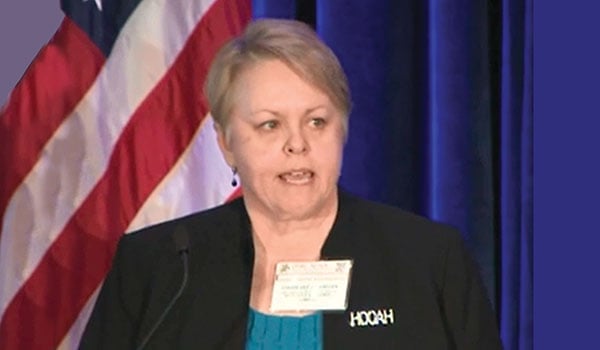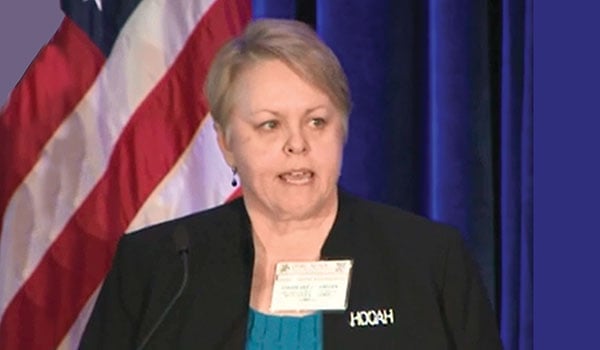
Family Forum / By Judy Konitzer: I enjoyed the opportunity to attend AUSA’s Annual Meeting held on October 3-5 in Washington D.C. Not only was I able to network with many of the organizations that support our Soldiers and their families, but I also attended several of the Family Forums that were offered.

Cherri Verschraegen, Chief of Army Child and Youth Programs at Installation Management Command headquarters, addresses attendees at the AUSA Family Forum in Washington, DC on October 3, 2016. / ASSOCIATION OF THE U.S. ARMY VIDEO CAPTURE
One entitled “An Update on Military Kids: How Are They Doing? What Do They Need?” particularly captured my attention.
Being a military kid sometimes adds 6-9 moves before high school graduation, frequent deployments, encountering reintegration, and experiencing what other kids are dealing with these days is a part of their lives. Bullying, increased academic pressures, loss of childhood playtime, availability of alcohol and drugs, increased exposure to inappropriate content via the internet, and overuse of social media (kids tend to put their whole lives on this) all add up.
Findings from the RAND Deployment Life Study indicate the stressful impact that their wartime military life has had on them, but also points to their resilience. This type of survey gives credibility to establishing programs that will help kids not only survive, but thrive and excel in this environment, according to Cherri Verschraegen, Chief of Child, Youth & School Services (CYS) for Installation Management Command (IMCOM). “It has to be the basis for the programs we offer” and will help reduce the conflicts between the Army mission and parenting responsibilities.
Resilience
Resiliency involves skills that help in decision making, as well as planning and problem solving, and the Army Youth program is working to “identify, reinforce, and build on inherent strengths that can facilitate positive youth development.”
Their training mentor, Dr. Kenneth Ginsburg’s 7Cs of resilience provide a framework for their programs.
- Competence: Having the ability or know-how to handle situations effectively, make responsible choices, and face difficult situations.
- Confidence: Having a solid belief in one’s own abilities, (because I am competent)!
- Connection: A solid sense of security that comes from close ties to family, friends, school, and community that produces strong values and helps avoid destructive alternatives.
- Character: A fundamental sense of right and wrong that can lead to making wise choices, and a desire to contribute to the world.
- Contribution: When children realize that the world is a better place because they are in it, they understand the importance of personal contribution. They gain a sense of purpose that can motivate them.
- Coping: Healthy alternatives and resources to deal with stress.
- Control: When children realize that they can control the outcomes of their decisions and actions, then they‘re more likely to know how to bounce back.
CYS Programs
The CYS programs begin with the Child Development Center (CDC), where child care and preschool programs are based on social/emotional development, life skills, good nutrition habits, and healthy active play which are built into everyday routines. Availability as well as affordability for quality care for single and dual military parent households is critical here. For Active, Guard, and Reserve families who do not live near installations or where post centers are full, CYS is working with community-based programs who provide these goals and offer financial assistance if needed.
Building resiliency continues through school age programs, because coming home after school to an empty house is “not cool.” Fitness initiatives, sports, cooking classes, homework assistance, science, technology, engineering, mathematics (STEM) projects, as well as fun is offered through CYS.
For families living off-post, Ms. Verschraegen relies on community-based partners to provide similar, as well as affordable programs. Based on the success of the Master Resiliency Program, efforts are now being made to offer Resiliency Training for Youth with pilot programs offered at 18 different sites and the hope to offer it worldwide soon.
Army Fee Assistance (AFA) helps to find affordable childcare needs unique to the military. Through this program, families are eligible to receive monthly fee assistance to help offset the cost of childcare in their communities. Applications for AFA should be submitted to Child Care Aware of America® www.usa.childcareaware.org/military-programs/military-families/army/.
When DoD approved sites etc. are not available due to distance or waiting lists etc., waivers to find caregivers can sometimes be allowed on a case-by-case basis. Families requesting care in a DoD Child Development Center, school age program, or Family Child Care Development home should visit militarychildcare.com.
Full access to this AUSA Forum, as well as others offered, is available on-line at www.ausa.org/military-families/family-readiness-annual-meeting-activities.
Judy Konitzer is the family forum editor for ARMY AVIATION; questions and suggestions can be directed to her at This email address is being protected from spambots. You need JavaScript enabled to view it..”>This email address is being protected from spambots. You need JavaScript enabled to view it..
Scholarship Foundation
Oh, the Wonderful Ways One Can Give Continued from page 50
Annuity Giving Program: The rate of return that you receive is dependent on your date of birth and is locked in for life. Details of this program can be found on our website, quad-a.org, under “Scholarship.”
Bequest Options: A major benefit of making a Charitable Bequest can not only enable you to contribute to AAAA SFI after you pass on, but also to save estate taxes by providing your estate with a charitable deduction for the value of the gift. Several options exist: you can gift a dollar amount; gift a percentage of your estate; gift a specific asset such as an insurance policy; gift the residual of your estate; or gift a retirement asset like an IRA or 401(k). Any of these gifts can be donated to any of the Funds (General, Families of the Fallen, Chapters, Perpetual), designated in your name, or in honor of a loved one.
Regardless of the method you use to contribute to the AAAA SFI, it will provide a dual benefit: one is private whereby you can feel good knowing your treasure is going to a worthwhile cause and the other is public where the recipients of these scholarships will greatly appreciate the financial assistance.
BG (Ret.) Thomas (Tom) J. Konitzer is a former AAAA National President and currently serves as the vice president of the AAAA Scholarship Foundation, Inc.








